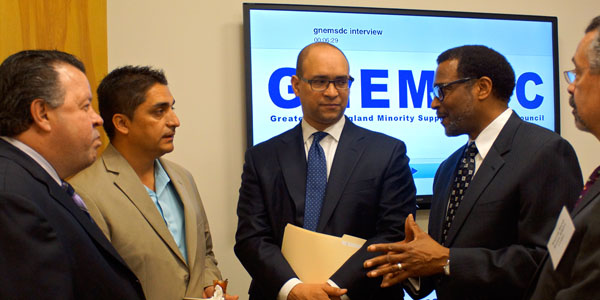
A growing minority business development center has returned to Bridgeport after more than a decade away.
The Greater New England Minority Supplier Development Council, which originated in Bridgeport in 1976, helps to connect about 250 corporate members with 500 suppliers that are minority-owned businesses. Since its founding, the council has helped to facilitate more than $4 billion in contracts.
“For a number of reasons the minority community hasn”™t been as plugged-in in this country,” said council CEO Fred McKinney. “We”™re there to make those connections.”
The council moved its headquarters to Hamden in 2000 and opened a satellite office in Boston in late 2011, but McKinney said the organization has decided to move back to Bridgeport, where he said there is a higher concentration of minority-owned businesses.
Plus, he said, the council will be in close proximity to the large corporate community in Fairfield County. In relocating back to Bridgeport, the council hopes to double both is corporate and minority memberships. The Boston office will also remain open.
“Being in a city like Bridgeport will make it easier for us to connect with both our major stakeholders: large corporations and minority businesses,” McKinney said. “Frankly we haven”™t done as well in Fairfield County and I know we could do better.”
Already, the organization”™s list of corporate members includes Pitney Bowes Inc., Xerox Corp., Boehringer Ingelheim Pharmaceuticals Inc. and United Technologies Corp., which are among the county”™s largest employers.
In 2011, the council”™s minority members had more than $13 billion in sales and employed more than 60,000 employees, half of whom were minorities. The group estimates that for every $96 invested, the council generates $1 million in new contracts.
McKinney said contracting with minority businesses is not only the right thing to do, but increasingly has become the smart thing to do as well.
“If you”™re not paying attention to diversity in marketing, hiring or supplier diversity, then you are probably not maximizing the value of your company,” McKinney said, pointing to the fact that the United States will soon become a majority-minority population, much like Bridgeport.
McKinney said there”™s also a social benefit to contracting with minority businesses, noting that minority business owners are likely to spread the positive word to their communities.
Peter Hurst Jr., CEO of The Community”™s Bank in Bridgeport and a member of the council, agreed.
“If you look at the demographics in this country, the ethnic minority population is growing,” Hurst said. “For those corporations that think it”™s strategically important to do business with minority-owned businesses, it”™s not just a new source of revenue. Their customer base looks at their contracting records and it could actually help them generate customers in their broader market.”
Hurst said he was glad to see the group moving back to Bridgeport and only a few blocks away from his office. Between 50 and 100 accounts of his were referred to his bank through the council.
“It”™s a great resource for finding real opportunity, both with corporate and minority members,” Hurst said. “It”™s a tremendous resource for us.”


















Comments 1